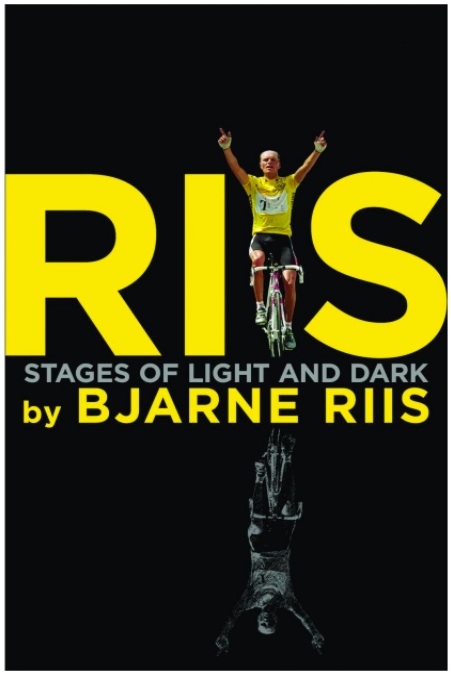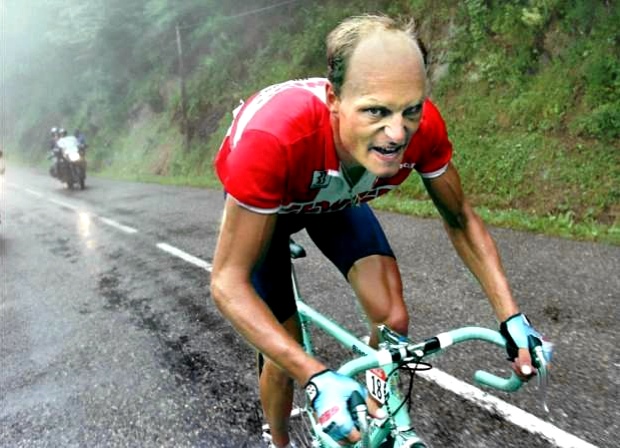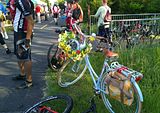The rider Bjarne Riis was a rider who featured in my early interest in road cycling and the Tour de France. He wasn't a rider that I ever learned much about at the time, he was infamous for his private nature and like many riders from his era questioned about how clean a rider he was.
Riis is perhaps famed as much for his win of the 1996 Tour de France as his eventual and more recent admission to EPO usage during his career. The book which is ghost written by journalist Lars Steen Pedersen, is a look back over those years in an attempt to reveal his dark secrets and bring light to on his questionable past.
The book takes you back to his past and to the the cycling world he grew up in, talking about how as a shy youth he found cycling an outlet where he could express himself. Actually his early years is somewhat skipped over in my opinion but forms some of the most interesting aspects of the book or at least the most honest. He talks with some fondness of riding and learning from Laurent Fignon, which makes for interesting reading and you learn of his desire to make his break with the bigger teams, trying to get himself more noticed to earn the bigger pay check. The book follows an almost similar pattern to many other cycling books of a young clean rider, naive to the real world of cycling and doping, and his eventual demise to user followed by guilt. However, if you are seeking an open account and insight into the dirty world of the peleton then you will be left disappointed.
His admission to taking EPO is mentioned but Riis blows over the subject as though he is doing what every other rider his doing. It certainly central to the narrative. There is no name dropping and you can't but help that he holds back detail. In his admission to using EPO there is no mention in how he got it, how he used it just emotional reaction to having to use it. This has probably got a lot to with him still working within cycling and 'spitting in the soup' is something he is not still willing to do. This is you feel quite a theme in the book. It's not what he telling you but what he is missing out. His accounts of the Festina affair in 1998 from his point of view labours on the side of hypocritical as he complains of them 'riding like animals' and the press lumping them all together with the same label as dopers. It just strikes that he is still unhappy that he was out doped rather than real remorse for the damage being done in the sport.
What is apparent in his admission is the lack of actual belief that doping had anything to do with his success of the tour and he attributes much more of it to his scientific approach to cycling compared to other riders who still just churned out the miles. He talks in length about some of the stages of the tour in which he wins and his rise as a team leader and getting the riders to respect him. His overcoming of his natural shyness to champion is an interesting tale but it is more in the latter parts of the book I found more interesting and that is his time as team owner and directeur sportif for the CSC team. It does give good insight into the personalities of the riders he has worked with including Tyler Hamilton, Carlos Sastre and Alberto Contador.
The book doesn't make him out to be the most likable of people and this probably his why he struggled with riders on his team as both rider and team leader, and his inevitable admission to doping feels like it comes not from real guilt but pressure from the press after members of his previous Telekom team speak out. It has rings of the same scenario we now see with Lance Armstrong.
Overall, the book has some good aspects to it but it also feels self serving, a confession of some sorts while deeper details have been left out, and think it is this that makes it hard for the reader to have any really empathy for him Maybe when he fully retires will a broader picture be painted.




























3 Comments:
Hi Jez, my take on doping in cycling is that it's always been apart of it at the top level, i would hazard a guess that you could count on one hand the in the last 30 years the number of clean race winners. The only thing surprises me is the shock and surprise by the public and the press when a doper is found out/come clean(no pun there)In some ways i actually feel sorry for the riders who are been demonised and hung out to dry (Lance included) while UCI and the people who run the teams are getting away scotfree. The focus on the riders is just what UCI wants because if the real truth came out it would probably kill the sport. Doping has been institutionalized in the sport and that's what should be being looked at not the individual riders, because they havn't done it with out the help of the the people running the teams and the UCI burying it's head up it's arse. Doping and cycling have always been bedfellows and even now with a concerted shift to cleaner racing with teams like Sky i still think there will be a significant number who will dope and with help of some of the people who run the teams.
I agree with a lot of what you are saying here, and they are points I've expressed before deep within this blog. I'm not sure its a shock people feel but more disappointment that riders they support have cheated. You always hope they are clean but doubt does creep in. If Wiggins got caught id be gutted and I know this is how a lot of hardcore Lance fans felt on his admission.
The level of rot is deep no doubt and has at some point spirraled as teams try to out dope each other. What bothers me (and going back to this book) is how riders face up to their own guilt. Sometimes we never really get the full story, the full truth. Floyd Lands once wrote a book about his innocence before admitting doping and that is the ultimate lie. I just wish that if we are to read a personal account from a rider we are reading fact not fiction.
This is problem Jez there is no guilt because they feel it was part of there job that's why I feel some sympathy perhaps sorry was the wrong word. It will always be a case of damage limitation because the truth is so scary. Even Sky who have staked there reputation on being clean are doing it they won't accept anyone with a known doping past but i find it very hard to believe that Dave Brailsford didn't know about Sean Yates past before this whole Lance thing blew the lid off.
Post a Comment